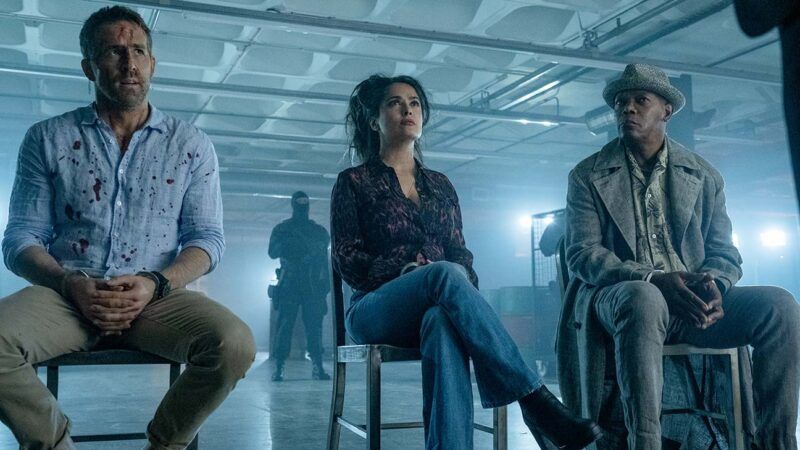Somehow, The Hitman's Wife's Bodyguard Is About Professional Licensing Requirements and EU Sanctions
A terrible movie about a bodyguard trying to regain an occupational certification.

Would you believe me if I told you The Hitman's Wife's Bodyguard, a turgid sequel to the 2017 Ryan Reynolds/Samuel L. Jackson gunfire 'n' wisecracks fest, The Hitman's Bodyguard, was actually a movie about European fiscal imbalances and occupational licensing?
No? OK, fair, I wouldn't believe me either, if I hadn't seen the movie. But I have seen the movie, and as far as I can tell it's about those things as much as it's about anything.
Which, granted, is not saying much, since this tedious procession of unfunny one-liners and listless action sequences works overtime to avoid sticking with any dramatic or thematic impulse for long. But the plot, to the extent there is one, revolves around a bodyguard (Reynolds) who has given up guns following the revocation of his professional license, teaming up with a hitman (Jackson), and the hitman's wife (Selma Hayek), to stop a terrorist (Antonio Banderas) who is threatening to destroy the European Union's power grid in response to the imposition of new sanctions on Greece. There's chaos in the streets, a monologue or two about restoring Greece to its rightful prominence as a global power, and an awful lot of bad jokes.
This isn't the sort of movie you're supposed to think about. It's such a slapdash and lazy production that it practically repels thought. Yet the movie's villain is motivated by a desire to unwind the demoralizing effects of multinational political control, and the movie's hero is driven by the hope of regaining a professional certification he views as a necessary part not only of his work but of his identity. Without a license, the movie seems to ask, is a bodyguard really a bodyguard at all? Similarly, if greater Europe can effectively control Greece's politics through external economic pressure, is Greece really a functioning country at all?
The film is not particularly interested in answering these questions, and indeed it's not even clear if the filmmakers knew they were asking them; the movie is much more concerned with staging haphazard shootouts and having Jackson and Reynolds yell four-letter-word-filled insults at each other. The movie is a loud, incoherent, and tiresome exercise in unnecessary sequel-izing, devoid of a single funny exchange or engaging action set piece.
But there is a brief glimmer of hope in one of the movie's better scenes—again, not saying much—in which Jackson, the hitman working for himself, coaches Reynolds through some profanity-laced, self-affirming talk about how he doesn't need a license to do his work.
Has he finally learned to understand that his professional worth isn't dependent on an official slip of paper? For a moment it seems so, as he regains his confidence and shoots and quips his way through the third act. Sadly, it turns he hasn't found a new way of looking at life, independent of licenses and certifications.
Instead—spoilers!—he's just found a route back to being fully licensed professional, as an Interpol agent restores his license in the movie's coda. It's a win for two things the world needs less of: international bureaucracy and occupational licensing. I warned you this movie was terrible.

Show Comments (8)